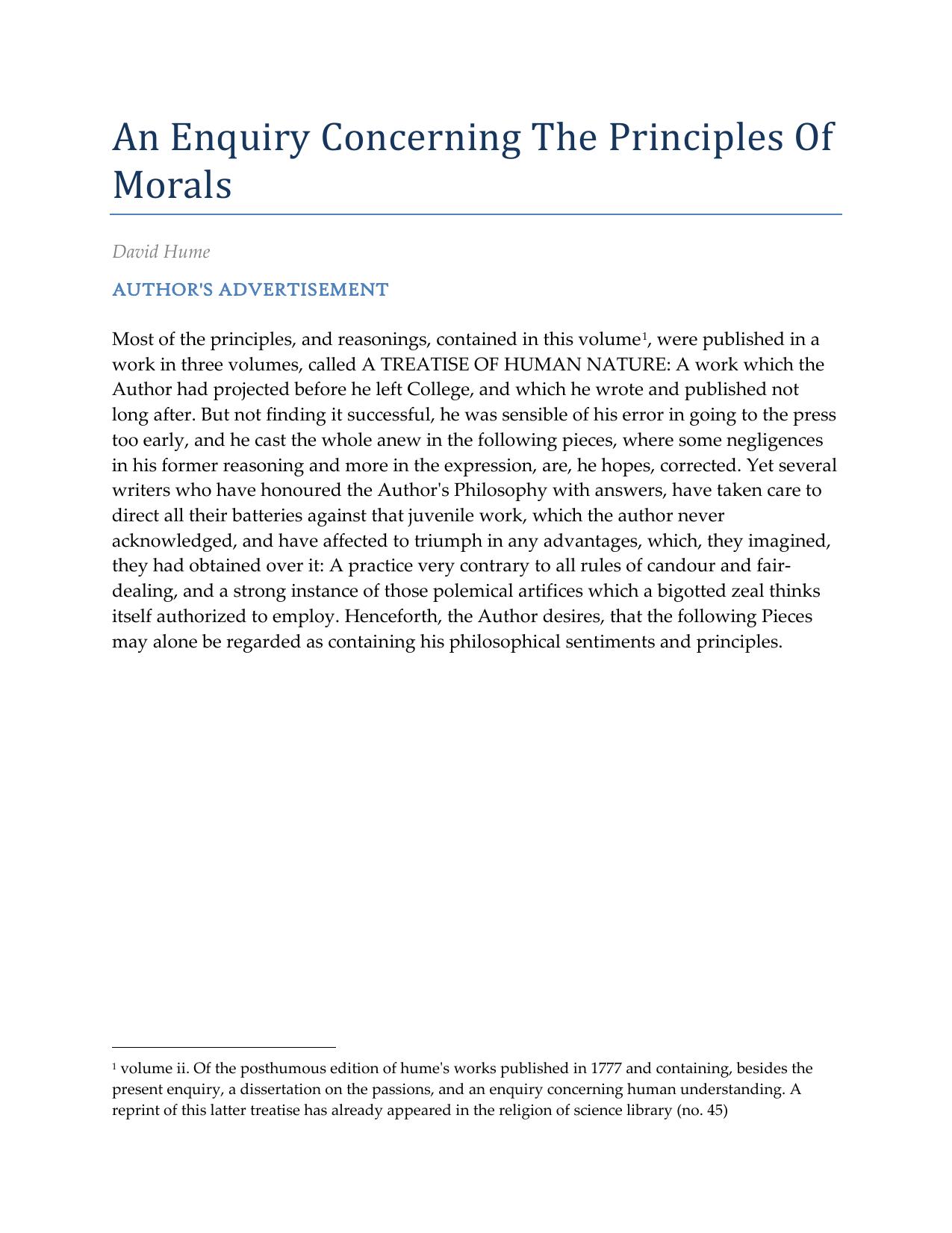An Enquiry Concerning the Principles of Morals by David Hume

Author:David Hume [Hume, David]
Language: eng
Format: epub, mobi, pdf
Tags: Ethics, Conduct of life
Published: 2003-08-01T03:00:00+00:00
Few men would envy the character which Caesar gives of Cassius:
He loves no play,
As thou do'st, Anthony: he hears no music:
Seldom he smiles; and smiles in such a sort,
As if he mock'd himself, and scorn'd his spirit
That could be mov'd to smile at any thing.
Not only such men, as Caesar adds, are commonly DANGEROUS, but also, having little enjoyment within themselves, they can never become agreeable to others, or contribute to social entertainment. In all polite nations and ages, a relish for pleasure, if accompanied with temperance and decency, is esteemed a considerable merit, even in the greatest men; and becomes still more requisite in those of inferior rank and character. It is an agreeable representation, which a French writer gives of the situation of his own mind in this particular, VIRTUE I LOVE, says he, WITHOUT AUSTERITY: PLEASURE WITHOUT EFFEMINACY: AND LIFE, WITHOUT FEARING ITS END. [Footnote: 'J'aime la vertu, sans rudesse; J'aime le plaisir, sans molesse; J'aime la vie, et n'en crains point la fin.'-ST. EVREMONT.]
Who is not struck with any signal instance of greatness of mind or dignity of character; with elevation of sentiment, disdain of slavery, and with that noble pride and spirit, which arises from conscious virtue? The sublime, says Longinus, is often nothing but the echo or image of magnanimity; and where this quality appears in any one, even though a syllable be not uttered, it excites our applause and admiration; as may be observed of the famous silence of Ajax in the Odyssey, which expresses more noble disdain and resolute indignation than any language can convey [Footnote: Cap. 9.].
WERE I Alexander, said Parmenio, I WOULD ACCEPT OF THESE OFFERS MADE BY DARIUS. SO WOULD I TOO, replied Alexander, WERE I PARMENIO. This saying is admirable, says Longinus, from a like principle. [Footnote: Idem.]
GO! cries the same hero to his soldiers, when they refused to follow him to the Indies, GO TELL YOUR COUNTRYMEN, THAT YOU LEFT Alexander COMPLETING THE CONQUEST OF THE WORLD. 'Alexander,' said the Prince of Conde, who always admired this passage, 'abandoned by his soldiers, among barbarians, not yet fully subdued, felt in himself such a dignity and right of empire, that he could not believe it possible that any one would refuse to obey him. Whether in Europe or in Asia, among Greeks or Persians, all was indifferent to him: wherever he found men, he fancied he should find subjects.'
The confident of Medea in the tragedy recommends caution and submission; and enumerating all the distresses of that unfortunate heroine, asks her, what she has to support her against her numerous and implacable enemies. MYSELF, replies she; MYSELF I SAY, AND IT IS ENOUGH. Boileau justly recommends this passage as an instance of true sublime [Footnote: Reflexion 10 sur Longin.].
When Phocion, the modest, the gentle Phocion, was led to execution, he turned to one of his fellow-sufferers, who was lamenting his own hard fate, IS IT NOT GLORY ENOUGH FOR YOU, says he, THAT YOU DIE WITH PHOCION? [Footnote: Plutarch in Phoc.
Download
An Enquiry Concerning the Principles of Morals by David Hume.mobi
An Enquiry Concerning the Principles of Morals by David Hume.pdf
This site does not store any files on its server. We only index and link to content provided by other sites. Please contact the content providers to delete copyright contents if any and email us, we'll remove relevant links or contents immediately.
| Deconstruction | Existentialism |
| Humanism | Phenomenology |
| Pragmatism | Rationalism |
| Structuralism | Transcendentalism |
| Utilitarianism |
The remains of the day by Kazuo Ishiguro(7587)
Tools of Titans by Timothy Ferriss(6983)
The Black Swan by Nassim Nicholas Taleb(6220)
Inner Engineering: A Yogi's Guide to Joy by Sadhguru(5923)
Giovanni's Room by James Baldwin(5904)
The Way of Zen by Alan W. Watts(5815)
The Six Wives Of Henry VIII (WOMEN IN HISTORY) by Fraser Antonia(4807)
The Power of Now: A Guide to Spiritual Enlightenment by Eckhart Tolle(4781)
Astrophysics for People in a Hurry by Neil DeGrasse Tyson(4634)
Asking the Right Questions: A Guide to Critical Thinking by M. Neil Browne & Stuart M. Keeley(4609)
12 Rules for Life by Jordan B. Peterson(3761)
The Ethical Slut by Janet W. Hardy(3523)
Skin in the Game by Nassim Nicholas Taleb(3489)
Housekeeping by Marilynne Robinson(3427)
The Art of Happiness by The Dalai Lama(3400)
Double Down (Diary of a Wimpy Kid Book 11) by Jeff Kinney(3292)
Skin in the Game: Hidden Asymmetries in Daily Life by Nassim Nicholas Taleb(3280)
Walking by Henry David Thoreau(3242)
12 Rules for Life: An Antidote to Chaos by Jordan B. Peterson(3211)
